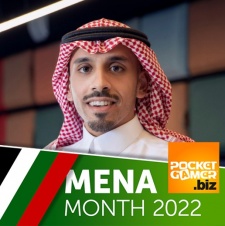Ahead of a month-long celebration of the gaming industry in the MENA region, which encompasses Pocket Gamer Connects Jordan, we caught up with Nasser Alkathari of MCIT (Ministry of Communications and Information Technology) and Asma Altuwaijri of SEF (Saudi E-Sports Federation) at PGC Helsinki, to talk about what’s happening in the Kingdom of Saudi Arabia.
______________________________________________________________________________________
PocketGamer.biz: please could you both introduce yourselves and describe your roles?
Asma: My name is Asma Altuwaijri, and I am in the Saudi Esports Federation in charge of the Academy. The objective of it is to really have programs for the players and upscale them to be a professional in the market, and then participate in more tournaments and competitions. We also have another path which is focussing on masters programs in Esports, for refereeing, broadcasting and events, project management and so on.
Nasser: I am Nasser Alkathari, Program Manager at the Ministry of Communications and Information Technology. We operate at the Center of Digital Entrepreneurship (CODE) in the fields of emerging technologies. Right now, we’re running multiple programs in gaming where we acknowledge the game founders program. The 9 month incubation and acceleration program supports the establishment of 15 start-ups, which will be injected into the ecosystem. We have multiple programs with universities to support local entrepreneurs in the field, so our target is to enable and empower the gaming ecosystem in the kingdom.
Can I ask what sparked that, what has inspired this sudden boost for such programs?
Asma: So, for us it’s that most of the research has found that Saudi is a relatively young nation, and a lot of players have participated in international tournaments, and they have been winning. That got the attention of the government to have them look at this as one of the new sports that has to be tackled and have a focus on, and run programs for it to become professional. One of the KPIs that we have is that a Saudi player will be one of the top three winners.
Nasser: To add to what Asma said, we are a big nation in the consumption of games. So in the year 2020 the revenue from gaming was 1.17 billion dollars, and the retained revenue at the Kingdom was just 45 million dollars. So in comparison, the money that stayed in the Kingdom was just 4.5 percent. That pushed us to generate more games, have more companies in order to retain money in the Kingdom in order to affect and impact the GDP for the country.
It makes sense that rather than feeding somebody else’s economy, you would rather be feeding your own.
Nasser: Yeah, absolutely, that’s the plan.
In terms of COVID and the pandemic, how did that affect things in the Kingdom?
Asma: So this was the point of turnaround for us. It was that time when we started to have games with no borders. This is when it became big, international, and then Saudi realised, wow, we have a lot of gamers in the country – and this is how it started, when the pandemic started.
Has access to technology, and access to games, changed in recent years in Saudi?
Nasser: Yes, it’s been said today at the panel that 80% of Saudis have access [to games] now, and we got access to mobile gaming as we believed that consoles had sold [out] within the Kingdom during COVID. I was trying to buy a PlayStation, but it was hard as people were buying them, consuming games. The lockdown lasted three months and it was a boost to the gaming industry.
But have you seen, as we have in America, India and the European market that there has been a downturn recently in terms of the number of players? Or is the market actually still growing in Saudi?
Asma: I would say yes. It is growing rapidly. We have just finished Gamers 8, which is only in the summer season. It had so many competitions and tournaments internationally, where players and teams came and participated, so it’s actually growing very quick and fast for us.
If I’m correct, from what you’re saying, you didn’t really have that culture of gaming before, or esports?
Asma: Actually, we had it already. But we did not know it was that massive!
Was it more of an underground thing before, that’s now becoming mainstream?
Nasser: I was speaking about how the revenue generated from gaming coming up in Year 2020 was one billion, and before we were in the top 20 countries spending on gaming. We have the culture of gamers but the government initiatives right now enable it to be stable, to be successful, as well as the game development program that we have. So the culture is being guided right now by the government’s initiative and solutions.
Just so I understand correctly – you had a culture of gaming before, but not so much a culture of producing games?
Nasser: Absolutely. A hundred percent.
That’s really interesting - as you say, you have a young population in the Kingdom and irrespective of geography or culture, every time a new market comes forward there’s a new perspective, and there will always be fresh ideas.
What do you think the new ideas and influences will be coming out of Saudi?
Asma: One of the targets that we are looking for is to make a hub, that Saudi will be a hub for esports and the whole ecosystem, to help anyone who has a great initiative or idea - this is the place that you can do that, you can invite all the creators and the services, and have all the tools there. It will increase how many ideas people create.
Nasser: We have a unique culture in the Kingdom, our society, which has a unique flavor in comparison to other countries. So I believe that, in our first program, the [game changer] program, the start-ups were representing our culture. How did we know about Japanese culture? From their games – so we believe that our games will represent our culture, our mindset, our uniqueness, if I could say.
Is the government looking at specific privacy legislation with regards gaming for the Kingdom, along the lines of GDPR in Europe?
Nasser: I’m not an expert on this topic. However, I know that we have good privacy policies, So we have tough privacy policies – which is good. I’m not sure it’s the same as the US or the UK or Europe. However, I believe we have a good infrastructure regarding policies and privacy.
Do you know what the other gaming trends are in Saudi, aside from esports?
Asma: We are checking what Saudi players are doing, what’s happening internationally, you see when it’s a trend as they will be the first players who play and participate – and it’s rapidly changing. You can see that a game is [charting] so high, that a lot of players are playing it, but in a second month another game could pop up and they’ll like that more. So it’s different genres, Sometimes it’s a soccer game or fighting games, for example.
Nasser: Aside from what [Asma] is saying, globalisation and social media are pushing the world into similar trends. Six years ago, Pokemon Go was a trend in the Kingdom. So we are going through the trends – globalisation is pushing the world into a certain place and we are within this. But the difference is that as a culture we are interested in competitive games, as [Asma] was saying: Call of Duty and FIFA, are trending right now. I wouldn’t say there are specific games that Saudis are preparing. We are open to all games.
It’s great that there’s a female representative for esports. Are there a lot of women getting involved in that, in Saudi? Or is it male-dominated?
Asma: Based on our analysis, and documents that the SEF has received, female players are actually going up - one of them actually won the championship internationally! So we actually have good numbers of female players. We are a young nation and in the game, it’s no different if you are male or female, so it’s a really, really positive opportunity. And that’s really a good thing.
And is the idea to encourage more women into the games industry?
Nasser: Actually the first program is with producing games, that’s the game changer, 60% of the participants were women. So there is an interest from women to be programmers, and I believe that we don’t see it as women or men, we are opening the program to everyone from the Kingdom to apply. So I don’t see that we are focused into groups. As I was saying, it’s a new industry and it’s been built by both women and men.
That’s really good to hear. Is there anything else you want to tell me about or anything you want to add?
Asma: I’m just going to say that Saudi will be one of the top places in the world that hopefully any player wants to go to, and participate in tournaments or championships there. So we’ll be the hub!
I like that you aren’t saying “this is what we aim for”, you’re saying “This is what’s going to happen”
Nasser: Yes, this is the mindset we work with and hopefully we’re going to be one of the top countries programming and developing and publishing games. That’s the plan.

______________________________________________________________________________________
Our next annual event is Pocket Gamer Connects Jordan 2022, with two days of networking, learning, and presentations expected to be attended by over 700 gaming industry professionals from all over the globe.
As well as the conference it is possible to travel to Petra on Monday, 15th November, to see one of the true wonders of the world.
You can also join other global and MENA leaders two weeks later in Riyadh for our first Leaders Summit.





















